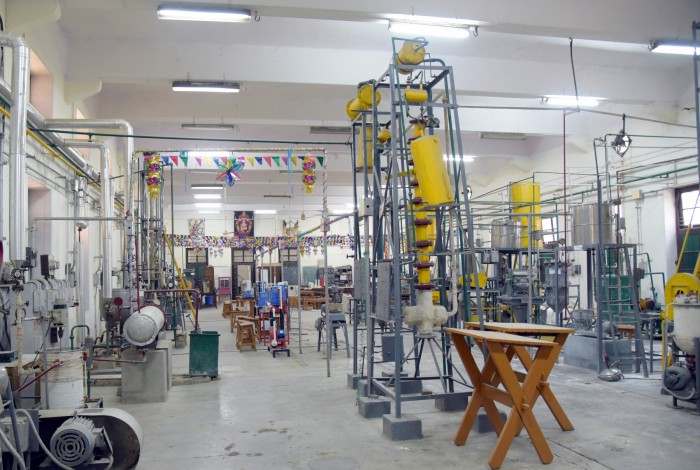Heat Transfer Lab
The Heat Transfer Lab in our undergraduate program plays a vital role in equipping students with a fundamental understanding of heat transfer principles and their applications. In many industrial processes, the addition or removal of heat significantly impacts their performance. Therefore, comprehending heat transfer rates is essential for designing various heat transfer units. The lab focuses on familiarizing students with the theory, structure, and basic operation of heat transfer equipment. By conducting a series of experiments, students gain hands-on experience and a deeper understanding of heat transfer principles. Some of the experiments carried out in the lab include Conduction through a Composite Wall, Thermal Conductivity Measurement Apparatus, Natural/Forced Convection Unit, Heat Transfer in an Agitated Vessel, Plate Heat Exchanger, Heat Transfer in Laminar Flow, Heat Transfer in Turbulent Flow, Thermal Radiation Unit, Boiling Heat Transfer Unit, and Shell Tube Heat Exchanger. Through these experiments, students gain practical insights into various heat transfer phenomena and learn how to analyze and optimize heat transfer processes. This practical knowledge enhances their problem-solving skills and prepares them for real-world applications in industries where heat transfer is crucial. The Heat Transfer Lab serves as an essential component of our undergraduate program, providing students with a solid foundation in this critical area of chemical engineering.
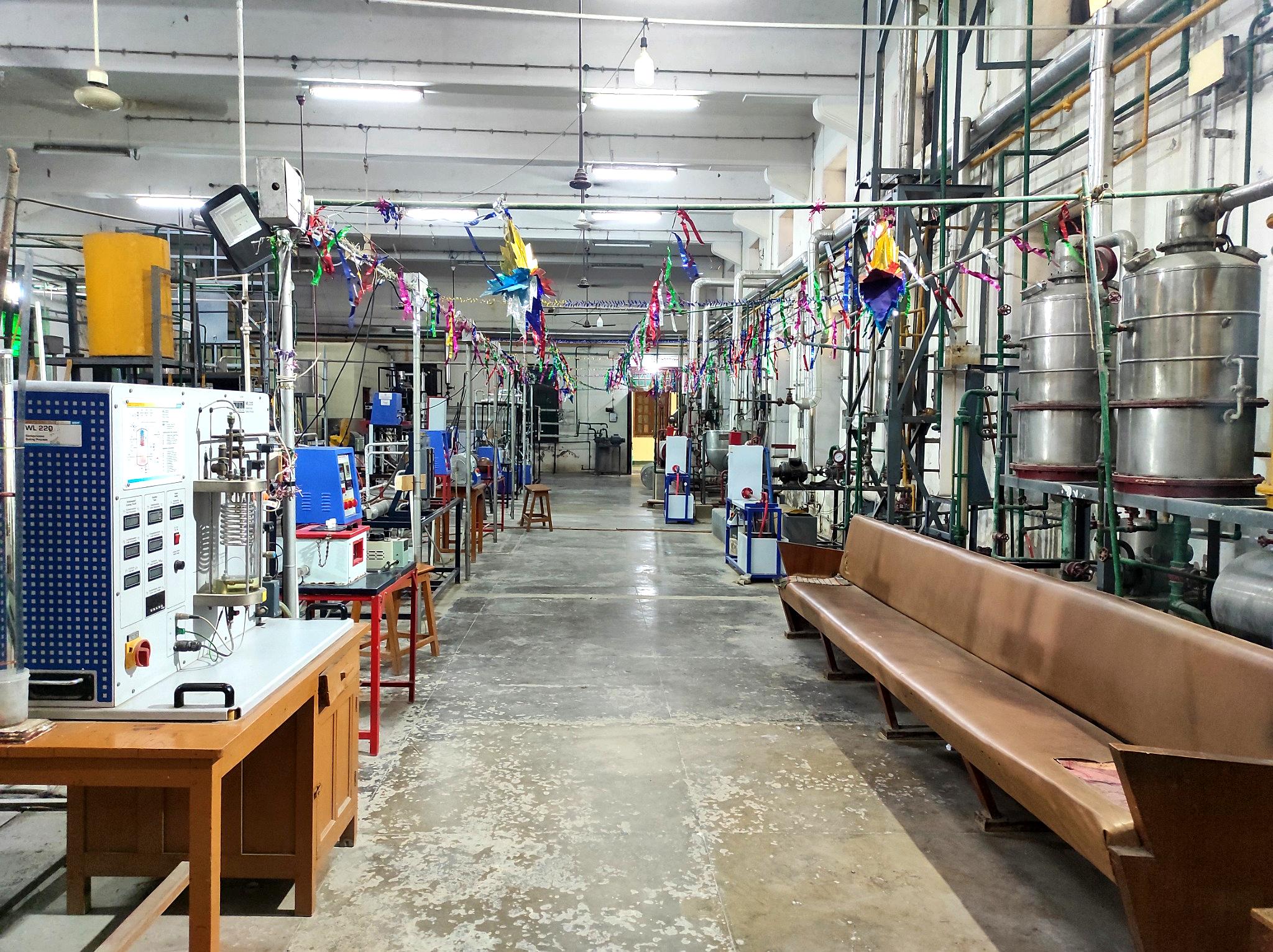
Mass Transfer Lab
The Mass Transfer Lab is a crucial component of our undergraduate program, offering students hands-on experience in understanding and analyzing mass transfer processes. In many industrial processes, the addition or removal of mass plays a critical role in their performance. Hence, comprehending mass transfer rates is essential for designing and optimizing various mass transfer units.
Equipped with state-of-the-art facilities and equipment, the Mass Transfer Lab provides students with practical exposure to various mass transfer phenomena. Some of the equipment available in the lab includes the Wetted Wall Column, Vapor-Air Diffusion Apparatus, Gas/Liquid Absorption Column, Vapor-Liquid Equilibrium Apparatus, Steam Distillation Unit, Liquid/Liquid Extraction Unit, Rotary Dryer, Fluid Bed Dryer, Packed Bed Distillation Unit, and Crystallization setups (both Seeding and without Seeding).
Through these experiments, students gain hands-on experience in conducting mass transfer operations, such as absorption, distillation, extraction, and drying. They learn to analyze mass transfer rates, understand the factors influencing mass transfer efficiency, and optimize process conditions.
The Mass Transfer Lab aims to familiarize undergraduate students with the fundamental principles of mass transfer and enable them to apply this knowledge to real-world scenarios. Students develop critical thinking skills, problem-solving abilities, and a deeper understanding of mass transfer phenomena by engaging in practical experiments and data analysis.
The Mass Transfer Lab is integral to our undergraduate program, providing students with the practical skills and knowledge necessary to excel in chemical engineering. It serves as a platform for students to bridge the gap between theoretical concepts and practical applications, preparing them for successful careers in industries where mass transfer processes are vital.
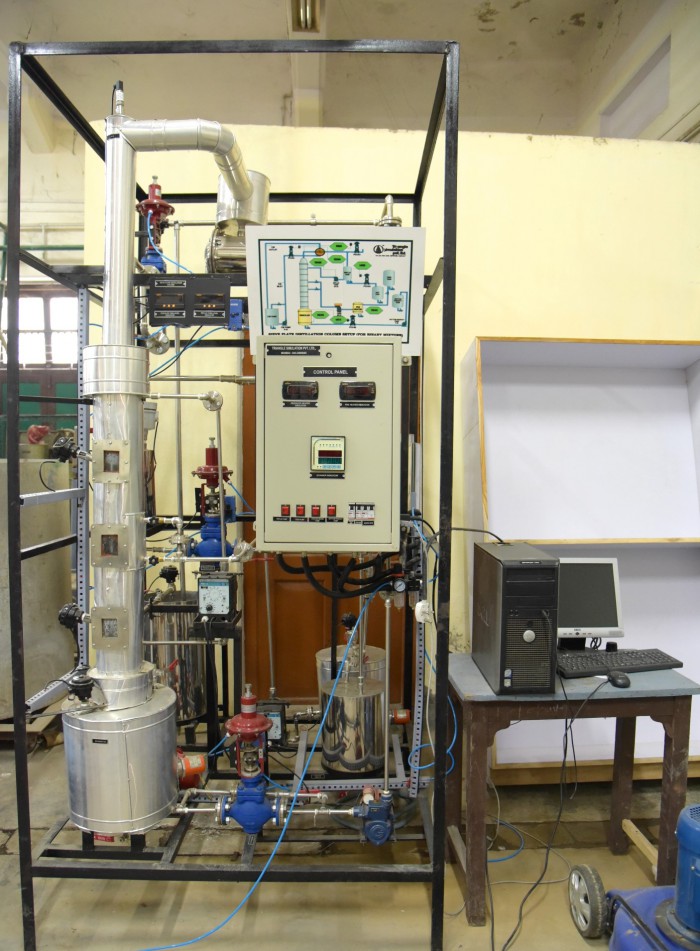
Fluid Flow Lab
The Fluid Flow Lab in our undergraduate program offers a comprehensive study of the properties and behaviors of compressible and incompressible fluids. Equipped with centrifugal pumps and various flow-measuring devices, this lab serves as a valuable resource for conducting fluid flow experiments. The lab is primarily utilized by undergraduate students to gain hands-on experience and practical insights into fluid flow operations. Additionally, both graduate and undergraduate students utilize this facility for their research projects, further enhancing their understanding of fluid dynamics. The lab features a range of experiments, including the Reynolds Apparatus, which investigates the flow characteristics of fluids, the Friction in Orifice Meter experiment, which explores the effects of friction in fluid flow, and the Friction in Circular Pipe Apparatus, which studies the frictional losses in pipe flow. Students also engage in experiments such as determining the equivalent length of pipe fittings, studying flow through a Venturi Meter, examining the characteristics of a centrifugal pump, and conducting experiments with Bernoulli's Apparatus. Additionally, the lab offers the Fluidized Bed Apparatus, which allows students to explore the behavior of particles in a fluidized state. By actively participating in these experiments, students gain practical knowledge and develop essential skills in analyzing and interpreting fluid flow phenomena. The Fluid Flow Lab plays a crucial role in enriching the educational experience of our undergraduate students and providing them with a strong foundation in fluid dynamics and its applications.
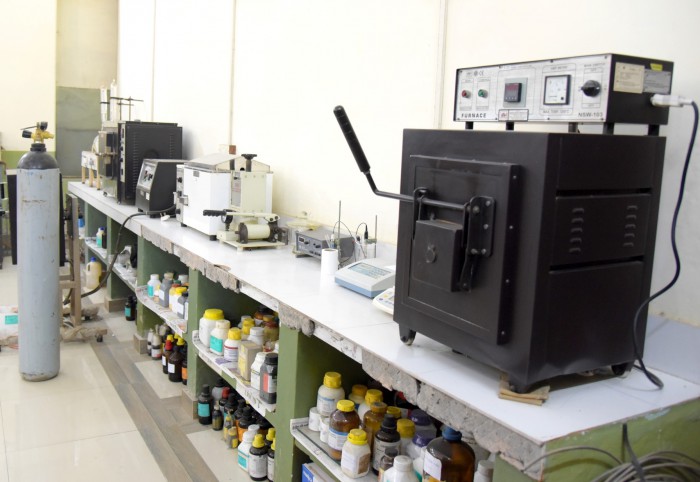
Mechanical Operations Lab
The Mechanical Operations Lab in our undergraduate program offers a comprehensive introduction to the mechanical operations utilized in the Metallurgical and Mining industries. The primary focus of this lab is to provide students with a strong understanding of the fundamental principles and operations of the equipment employed in these industries, rather than delving into detailed design aspects. Students gain insights into various mechanical operations through hands-on experiments and practical demonstrations. Some of the equipment covered in this lab includes the Ball Mill, Froth Floatation Cell, Jaw Crusher, Roll Crusher, Plate and Frame Filtration, Rotary Drum Vacuum Filter, Screening, Cyclone Separator, Sedimentation, and Leaf Filter. By working with these types of equipment, students acquire practical knowledge of their functionalities and learn how they are utilized in real-world scenarios. They gain a deeper understanding of the principles governing mechanical operations, including crushing, grinding, filtration, and separation processes. Through these experiments, students develop critical skills in operating and optimizing mechanical equipment, which is valuable in the Metallurgical and Mining industries. The Mechanical Operations Lab serves as a crucial component of our undergraduate program, equipping students with hands-on experience and practical expertise in the field of mechanical operations. This practical knowledge complements their theoretical understanding and prepares them for successful careers in industries where mechanical operations are an integral part of the process.
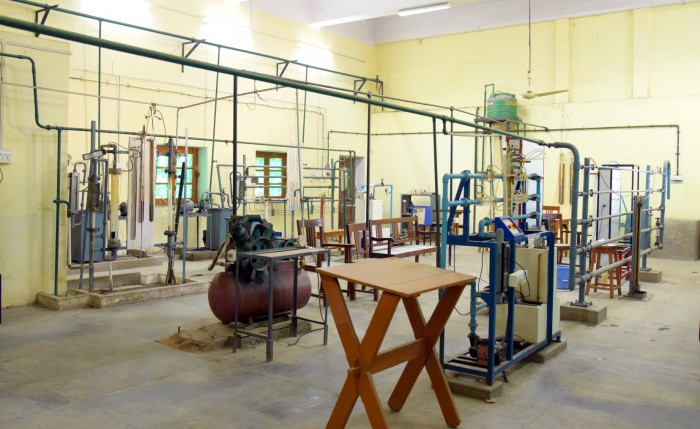
Chemical Reaction Engineering Lab
The Chemical Reaction Engineering Lab in our undergraduate program offers students valuable hands-on experience that complements the theoretical knowledge gained in the classroom. The lab experiments are thoughtfully designed to provide a comprehensive understanding of chemical kinetics and the operation of various reactors. In this lab, students can work with different reactors, including packed bed reactors, trickle bed reactors, and cascade CSTR (Continuous Stirred-Tank Reactor). They also engage in experiments involving Residence Time Distribution (RTD) studies in both CSTR and plug flow reactors. These experiments enable students to explore the dynamics and behavior of chemical reactions under steady or dynamic conditions. To enhance their learning experience, some experiments utilize the reactors' computer-controlled operation. This integration of technology further enriches students' understanding of reaction engineering principles and their practical applications. The lab encompasses a range of reactors, including adiabatic batch reactors, batch reactors, semi-batch reactors, and a combination of CSTR and PFR (Plug Flow Reactor). Through hands-on experimentation, students gain insights into reaction kinetics, reactor design, and the overall optimization of chemical processes. The Chemical Reaction Engineering Lab serves as a vital component of our undergraduate program, bridging the gap between theory and practice. By immersing themselves in practical experiments, students develop a deeper understanding of chemical reactions and reactor operation, preparing them for future challenges in the field of chemical engineering. .
Chemical Technology Lab
The Chemical Technology Lab is an integral part of the undergraduate program in Chemical Engineering. This lab provides students with hands-on experience in performing experiments related to synthesizing and analyzing various compounds. The lab serves as a platform for students to apply theoretical concepts learned in the classroom to practical scenarios. In the first year of the B.Tech. program, students are introduced to chemical engineering practices through various experiments. These experiments help them understand fundamental concepts and techniques used in the field. As they progress to the fourth year, students focus on experiments related to polymer science and technology, gaining specialized knowledge in this area. The Chemical Technology Lab has essential equipment and instruments to facilitate these experiments. Some instruments available include a viscometer for measuring viscosity, a Polylab (melding machine) for polymer processing, a Furness for temperature control, an incubator for controlled environment applications, and a shaker for mixing and agitation purposes. By actively engaging in the Chemical Technology Lab, students develop practical skills, learn how to handle chemicals safely and gain a deeper understanding of chemical processes and techniques. These experiences contribute to their growth as chemical engineers and prepare them for future professional endeavors in various industries. The lab is a valuable resource for enhancing their learning and practical knowledge of chemical technology.
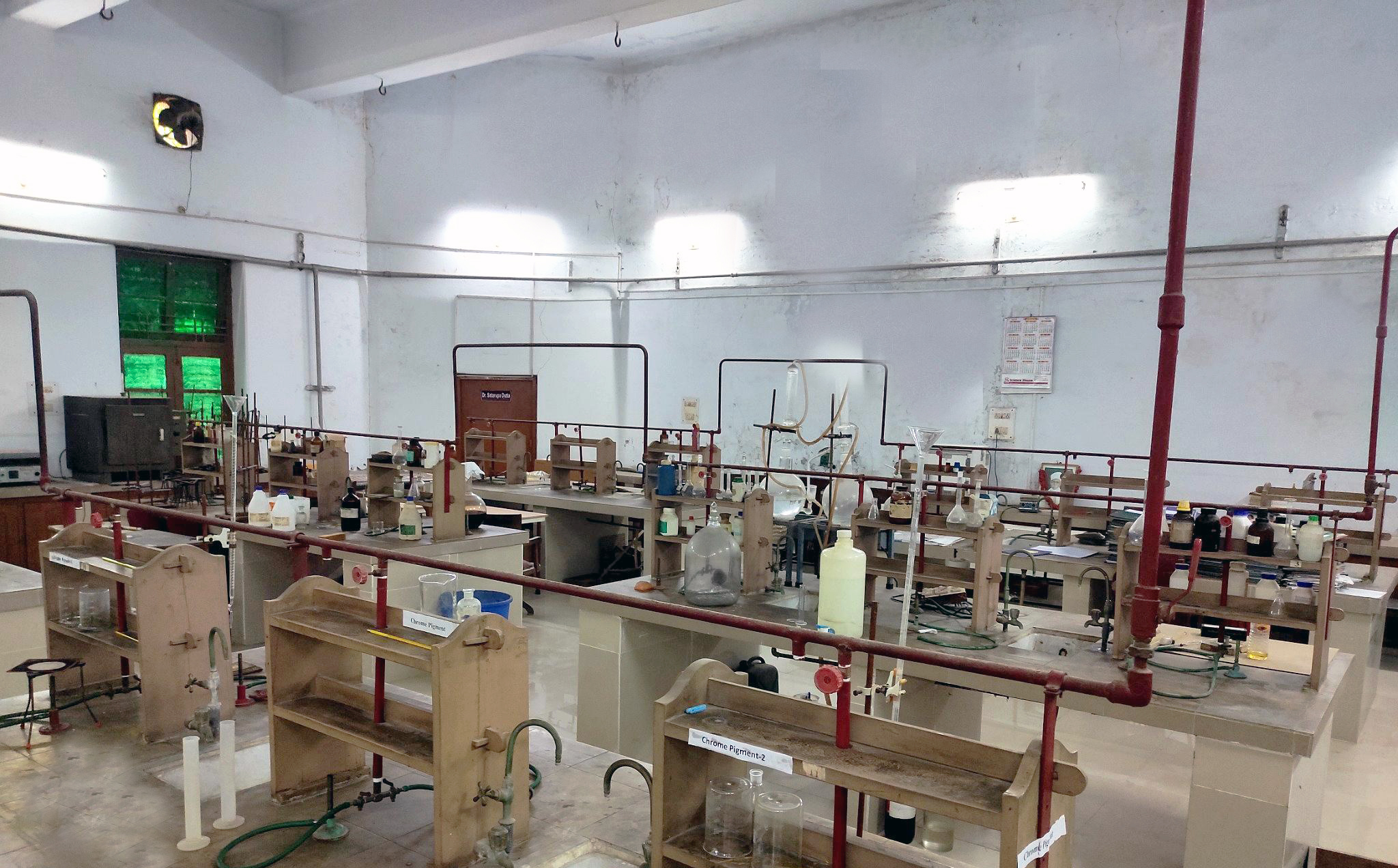
Computer Lab
The Computer Lab in our undergraduate program provides a dedicated space for students to learn and enhance their computational skills. With 69 computers and two servers, the lab offers a conducive environment for various computational activities. One of the lab's key uses is conducting simulation courses for final-year B.Tech. students. The lab is equipped with essential software tools such as MATLAB, Mathematica, StarCD, Fluent, Aspen Plus, and ChemCad. These software packages enable students to engage in a wide range of computational tasks, including multiscale simulations and optimization, as well as solving ordinary and partial differential equations (ODEs and PDEs). Through hands-on exercises and projects in the Computer Lab, students gain practical experience in applying computational methods to solve engineering problems. They learn how to model and simulate chemical engineering processes, analyze data, and optimize system performance using advanced software tools. The Computer Lab serves as a platform for students to develop proficiency in utilizing computational techniques to tackle complex challenges in the field of chemical engineering. By leveraging the power of these software tools, students enhance their problem-solving abilities and prepare themselves for the demands of the industry. Overall, the Computer Lab is an integral part of our undergraduate program, providing students with the necessary resources and opportunities to develop their computational skills and apply them effectively in their academic and professional pursuits.
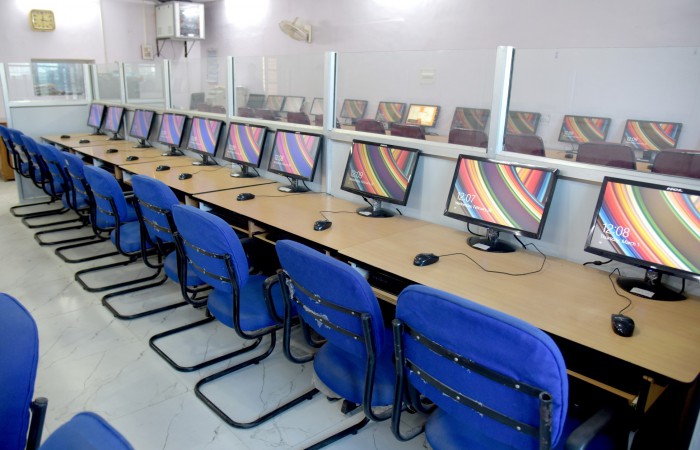
Sophisticated Instruments Laboratory
The Sophisticated Instruments Lab at our department is a testament to our commitment to cutting-edge research and technological advancements. As a DST-FIST Sponsored Department, we have established a state-of-the-art facility that enables us to conduct high-quality research in various fields of chemical engineering. The lab is equipped with sophisticated instruments that play a crucial role in advancing our research endeavors. Some of the cutting-edge instruments available include XPS (X-ray Photoelectron Spectroscopy), XRD (X-ray Diffraction), SEM (Scanning Electron Microscopy), FTIR (Fourier Transform Infrared Spectroscopy), TGA (Thermogravimetric Analysis), and many more. These instruments provide us with invaluable capabilities to analyze the structure, composition, and properties of materials at the microscopic and molecular levels. With their help, we can gain deep insights into the behavior and characteristics of materials, enabling us to develop innovative solutions and technologies. The availability of these sophisticated instruments in our lab not only enhances our research capabilities but also attracts extramural funding and collaboration opportunities with industry and academia. It allows us to conduct cutting-edge research projects, publish high-impact papers, and secure patents, contributing to advancing chemical engineering knowledge and its practical applications. The Sophisticated Instruments Lab is a vital resource for our research activities, enabling our faculty members and students to explore new frontiers in chemical engineering. With access to these advanced instruments, we can push the boundaries of scientific discovery and make significant contributions to the field. Our commitment to maintaining a state-of-the-art facility reflects our dedication to fostering excellence in research and innovation. The Sophisticated Instruments Lab serves as a hub of scientific exploration and plays a pivotal role in positioning our department at the forefront of advancements in chemical engineering. >
